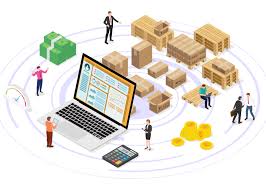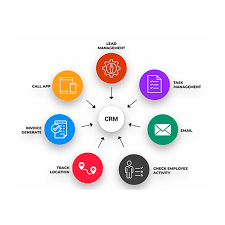Barcode Dispatch Software Solutions: Streamlining Inventory and Delivery Operations
In the increasingly competitive world of supply chain, retail, e-commerce, and manufacturing, the pressure to deliver faster, more accurately, and at lower costs is greater than ever. At the heart of efficient logistics lies two critical components: inventory management and dispatch control. Barcode dispatch software solutions bring these two functions together into one cohesive system, transforming outdated, manual processes into a seamless digital operation.
This article explores barcode dispatch software in detail—how it works, its key components, industry applications, major benefits, implementation strategies, and the future outlook for businesses aiming to modernize their logistics.
1. What is Barcode Dispatch Software?

Barcode dispatch software is an integrated solution that combines barcode technology with dispatch and logistics management features. It enables organizations to assign, track, and verify goods throughout the supply chain using barcode scans. From warehouse picking and packaging to final delivery, each item is tagged with a barcode that can be scanned to update its status in real time.
Barcode dispatch software typically includes:
- Barcode generation and printing
- Barcode scanning with mobile or handheld devices
- Real-time inventory updates
- Dispatch scheduling and route planning
- Delivery verification and digital proof of delivery (POD)
2. How It Works
Step 1: Barcode Tagging
Products are tagged with unique barcodes containing item-specific data (e.g., SKU, weight, batch number).
Step 2: Inventory Updates
As goods are received, moved, or picked for delivery, barcodes are scanned to update their status in the system automatically.
Step 3: Dispatch Assignment
Dispatch teams use the software to group items for delivery, assign them to vehicles, and generate digital manifests.
Step 4: Route Optimization
Dispatchers optimize routes for faster and cost-effective deliveries using built-in route planning features.
Step 5: Delivery Execution
Drivers scan packages at delivery points and collect proof of delivery (signature, photo, timestamp) via mobile app.
Step 6: Reporting & Analytics
Managers can generate reports on delivery times, inventory accuracy, missed deliveries, and fleet performance.
3. Key Features of Barcode Dispatch Software
1. Real-Time Scanning & Tracking
Track the exact location and status of each package at every stage of the dispatch journey.
2. Barcode Generator & Label Printing
Create and print barcodes on-demand using standardized formats (EAN, QR, Code 128).
3. Mobile App Integration
Mobile apps enable scanning, delivery confirmation, navigation, and task management for drivers and field staff.
4. Dispatch & Route Planning
Create dispatch schedules, assign delivery agents, and optimize routes to reduce travel time and fuel costs.
5. Digital Proof of Delivery (POD)
Capture e-signatures, delivery images, and comments to confirm successful order completion.
6. Role-Based Access Control
Manage permissions for warehouse staff, drivers, dispatch managers, and admins.
7. Alerts and Notifications
Send real-time alerts for dispatch start, delays, cancellations, and delivery completion.
8. Analytics and Reports
Custom reports on stock movement, delivery performance, customer satisfaction, and dispatch frequency.
4. Benefits of Barcode Dispatch Solutions
✅ Operational Efficiency
Barcode systems reduce manual data entry, eliminate paperwork, and speed up inventory handling and delivery operations.
✅ Improved Accuracy
Every scan ensures the right product reaches the right destination. Barcode validation prevents dispatching the wrong items.
✅ Real-Time Visibility
Live dashboards provide managers with up-to-the-minute status of deliveries, helping resolve issues proactively.
✅ Enhanced Customer Satisfaction
Accurate deliveries and live tracking build customer trust. Notifications and POD provide transparency.
✅ Cost Reduction
Optimize labor, reduce fuel usage, minimize returns, and prevent lost shipments—all contributing to reduced operational costs.
✅ Scalability
Solutions can grow with your business, supporting additional warehouses, users, and vehicles with minimal change.
5. Industry Use Cases
🏦 Retail & E-Commerce
Retailers use barcode dispatch systems to fulfill online and in-store orders efficiently. Automatic barcode scanning ensures the right items are picked, packed, and delivered, minimizing returns.
⚙️ Manufacturing
Manufacturers track the movement of raw materials, work-in-progress, and finished goods. Integration with ERP and MES systems provides full supply chain visibility.
🚚 Logistics & Courier Services
Logistics companies use dispatch solutions to assign deliveries to drivers, optimize routes, and capture POD at the doorstep.
🚑 Healthcare & Pharmaceuticals
Track temperature-sensitive goods, medical kits, and high-value equipment. Ensures compliance and chain of custody.
🏫 Education & Government
Schools, colleges, and public agencies track asset movements, IT equipment, and document dispatches using barcode systems.
6. Choosing the Right Barcode Dispatch Software
📆 Business Requirements Analysis
Start by evaluating your dispatch volume, inventory types, user roles, and existing systems.
🔄 Integration Capabilities
Ensure the software integrates well with your inventory, ERP, CRM, or order management system.
📊 Reporting Needs
Choose a solution with customizable reports and KPI dashboards to support decision-making.
📅 Budget and Licensing
Consider total cost of ownership, including software license, hardware (scanners, printers), and training.
📱 Mobile Support
Mobile access for drivers and dispatchers is crucial for on-the-go updates and delivery proofing.
7. Implementation Best Practices
✅ Pilot Run
Start with a small-scale implementation to test workflows and identify bottlenecks.
✅ Staff Training
Ensure all users are trained in scanning, app usage, and dashboard management.
✅ Label Standardization
Adopt standardized barcode formats and label sizes for consistent scanning.
✅ Real-Time Monitoring
Use dashboards to monitor dispatch KPIs, vehicle usage, and staff productivity.
✅ Continuous Improvement
Collect feedback and refine your dispatch process over time.
8. Future Trends in Barcode Dispatch Solutions
🤖 AI-Driven Route Optimization
Artificial Intelligence will play a growing role in predictive delivery scheduling and adaptive routing.
☁️ Cloud-Based Platforms
Cloud solutions offer scalability, reduced IT overhead, and real-time sync between multiple branches.
💻 IoT Integration
Connected devices can monitor package temperature, humidity, and shock—ideal for sensitive goods.
🧰 Voice-Enabled Scanning
Voice-guided picking and dispatch operations will further boost speed and accessibility.
📈 Advanced Analytics and AI Forecasting
Predictive analytics can forecast demand surges, route delays, and optimal resource allocation.
9. Notable Barcode Dispatch Software Examples
- Zoho Inventory – Affordable, cloud-based inventory and dispatch solution.
- Fishbowl – Integrated with QuickBooks and barcode scanning support.
- Odoo – Open-source ERP with barcode, stock, and delivery features.
- inFlow – Small business-focused inventory and barcode tool.
- NetSuite – Full ERP suite with advanced warehouse and dispatch features.
10. Conclusion
Barcode dispatch software is no longer a luxury—it’s a strategic requirement for any business dealing with product movement. By uniting barcode tracking with dispatch management, businesses can eliminate inefficiencies, improve service levels, and maintain real-time control over their logistics.
From inventory accuracy and faster deliveries to reduced costs and happier customers, the benefits are extensive. With the right solution, implementation strategy, and forward-looking mindset, any business can transition from manual chaos to automated excellence.
As the logistics world continues to evolve, barcode dispatch solutions will remain central to smart, scalable, and secure operations.
Need help choosing or building a barcode dispatch system tailored to your business?
Get in touch for expert advice, demos, or custom development support.


